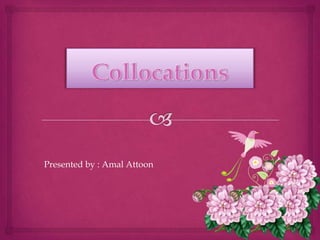
Collocations pp
- 1. Presented by : Amal Attoon
- 2. What is a collocation? A collocation is two or more words that often go together. These combinations just sound "right" to native English speakers, who use them all the time. Other combinations may be unnatural and just sound "wrong".
- 3. For example: Natural English... Unnatural English... the fast train the quick train fast food quick food a quick shower a fast shower a quick meal a fast meal
- 4. “ Can you make money? Definitely, this is not how you make money!
- 5. Why learn collocations? Your language will be more natural and more easily understood. You will have alternative and richer ways of expressing yourself. It is easier for our brains to remember and use language in chunks or blocks rather than as single words.
- 6. How to learn collocations Be aware of collocations, and try to recognize them when you see or hear them. Treat collocations as single blocks of language. Think of them as individual blocks or chunk. Remember to learn strongly sport, not strongly + support.
- 7. When you learn a new word, write down other words that collocate with it, such as: remember rightly, remember distinctly remember vaguely remember vividly
- 8. Read as much as possible. Reading is an excellent way to learn vocabulary and collocations in context and naturally. Revise what you learn regularly. Practice using new collocations in context as soon as possible after learning them.
- 9. that work for you. You Learn collocations in groups could learn them by topic (time, number, weather, money, family) or by a particular word (take action, take a chance, take an exam). You can find information on collocations in any good learner's dictionary. And you can also find specialized dictionaries of collocations.
- 10. Types of Collocation of collocation made There are several different types from combinations of verb, noun, adjective etc. Some of the most common types are: Adverb + Adjective: completely satisfied (NOT downright satisfied) Adjective + Noun: excruciating pain (NOT excruciating joy) Noun + Noun: a surge of anger (NOT a rush of anger)
- 11. Noun + Verb: lions roar (NOT lions shout) Verb + Noun: commit suicide (NOT undertake suicide) Verb + Expression With Preposition: burst into tears (NOT blow up in tears) Verb + Adverb: wave frantically (NOT wave feverishly)
- 12. He has to ------ the bus. hold catch touch
- 13. Some collocation list Have Take Break have a bat take a break break a habit have a drink take a chance break a leg have a good time take a look break a promise Next English club
- 14. Go back
- 15. Next slide